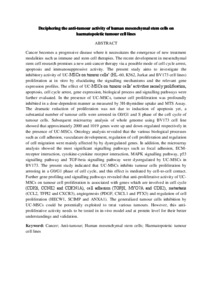Citation
Ramasamy, Rajesh
(2016)
Deciphering the anti-tumour activity of human mesenchymal stem cells on haematopoietic tumour cell lines.
In: 4th International Conference On Nanomedicine And Tissue Engineering (ICNT 2016), 12-14 Aug. 2016, Kerala, India. .
Abstract
Cancer becomes a progressive disease where it necessitates the emergence of new treatment modalities such as immune and stem cell therapies. The recent development in mesenchymal stem cell research promises a new anti-cancer therapy via a possible mode of cell cycle arrest, apoptosis and immunosuppressive activity. The present study aims to investigate the inhibitory activity of UC-MSCs on tumour cells’ (HL-60, K562, Jurkat and BV173 cell lines) proliferation at in vitro by elucidating the signalling mechanisms and the relevant gene expression profiles. The effect of UC-MSCs on tumour cells’ activities namely proliferation, apoptosis, cell cycle arrest, gene expression, biological process and signalling pathways were further evaluated. In the presence of UC-MSCs, tumour cell proliferation was profoundly inhibited in a dose-dependent manner as measured by 3H-thymidine uptake and MTS Assay. The dramatic reduction of proliferation was not due to induction of apoptosis yet, a substantial number of tumour cells were arrested in G0/G1 and S phase of the cell cycle of tumour cells. Subsequent microarray analysis of whole genome using BV173 cell line showed that approximately 2000 and 1019 genes were up and down-regulated respectively in the presence of UC-MSCs. Ontology analysis revealed that the various biological processes such as cell adhesion, vasculature development, regulation of cell proliferation and regulation of cell migration were mainly affected by by dysregulated genes. In addition, the microarray analysis showed the most significant signalling pathways such as focal adhesion, ECM-receptor interaction, cytokine-cytokine receptor interaction, MAPK signalling pathway, p53 signalling pathway and TGF-beta signalling pathway were dysregulated by UC-MSCs in BV173. The present study indicated that UC-MSCs inhibits tumour cells proliferation by arresting in a G0/G1 phase of cell cycle, and this effect is mediated by cell-to-cell contact. Further gene profiling and signalling pathways revealed that anti-proliferative activity of UC-MSCs on tumour cell proliferation is associated with genes which are involved in cell cycle (CDK6, CCNE2 and CDKN1A), cell adhesion (TGFβI, MYO7A and CD82), metastasis (CCL2, TFPI2 and CXCR3), angiogenesis (PDGF, CXCL1 and PTX3) and regulation of cell proliferation (HECW1, SCIMP and ANXA1). The generalized tumour cells inhibition by UC-MSCs could be potentially exploited to treat various tumours. However, this anti-proliferative activity needs to be tested in in-vivo model and at protein level for their better understandings and validation.
Download File
![[img]](http://psasir.upm.edu.my/53885/1.hassmallThumbnailVersion/Deciphering%20the%20anti-tumour%20activity%20of%20human%20mesenchymal%20stem%20cells%20on%20haematopoietic%20tumour%20cell%20lines.pdf)  Preview |
|
Text
Deciphering the anti-tumour activity of human mesenchymal stem cells on haematopoietic tumour cell lines.pdf
Download (159kB)
| Preview
|
|
Additional Metadata
Actions (login required)
 |
View Item |

